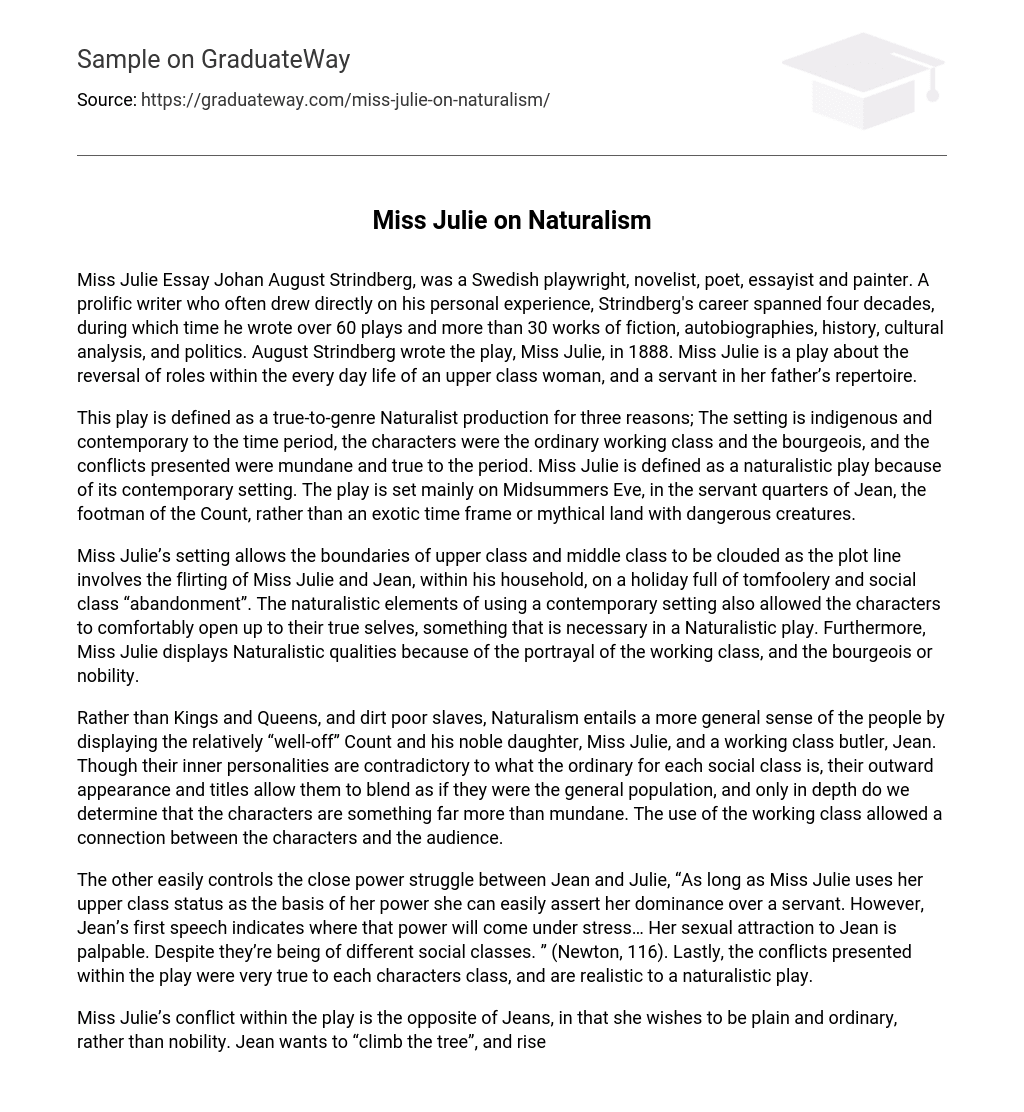Miss Julie Essay Johan August Strindberg, was a Swedish playwright, novelist, poet, essayist and painter. A prolific writer who often drew directly on his personal experience, Strindberg’s career spanned four decades, during which time he wrote over 60 plays and more than 30 works of fiction, autobiographies, history, cultural analysis, and politics. August Strindberg wrote the play, Miss Julie, in 1888. Miss Julie is a play about the reversal of roles within the every day life of an upper class woman, and a servant in her father’s repertoire.
This play is defined as a true-to-genre Naturalist production for three reasons; The setting is indigenous and contemporary to the time period, the characters were the ordinary working class and the bourgeois, and the conflicts presented were mundane and true to the period. Miss Julie is defined as a naturalistic play because of its contemporary setting. The play is set mainly on Midsummers Eve, in the servant quarters of Jean, the footman of the Count, rather than an exotic time frame or mythical land with dangerous creatures.
Miss Julie’s setting allows the boundaries of upper class and middle class to be clouded as the plot line involves the flirting of Miss Julie and Jean, within his household, on a holiday full of tomfoolery and social class “abandonment”. The naturalistic elements of using a contemporary setting also allowed the characters to comfortably open up to their true selves, something that is necessary in a Naturalistic play. Furthermore, Miss Julie displays Naturalistic qualities because of the portrayal of the working class, and the bourgeois or nobility.
Rather than Kings and Queens, and dirt poor slaves, Naturalism entails a more general sense of the people by displaying the relatively “well-off” Count and his noble daughter, Miss Julie, and a working class butler, Jean. Though their inner personalities are contradictory to what the ordinary for each social class is, their outward appearance and titles allow them to blend as if they were the general population, and only in depth do we determine that the characters are something far more than mundane. The use of the working class allowed a connection between the characters and the audience.
The other easily controls the close power struggle between Jean and Julie, “As long as Miss Julie uses her upper class status as the basis of her power she can easily assert her dominance over a servant. However, Jean’s first speech indicates where that power will come under stress… Her sexual attraction to Jean is palpable. Despite they’re being of different social classes. ” (Newton, 116). Lastly, the conflicts presented within the play were very true to each characters class, and are realistic to a naturalistic play.
Miss Julie’s conflict within the play is the opposite of Jeans, in that she wishes to be plain and ordinary, rather than nobility. Jean wants to “climb the tree”, and rise above his class, with intent to be a Count one day and own property. These two aspirations would be true to any countess not finding life on top of the world fulfilling, wishing to be something she has never been, and wanting the unknown to become known with her. As would the dream of becoming someone who you have not been before, dropping your life as a servant to become a Count, but only through using each other are these aspirations possible.
The Naturalistic elements of both party’s conflicts display their inherent needs for each other. In summation, the Naturalistic elements of Miss Julie, the contemporary settings, the usage of the working class and the bourgeois, and the ordinary problems associated with the characters allow the play to become a “true” Naturalist play. If Strindberg were to not include one of these elements, the play would not be considered a naturalistic play, and the basis of the story would have to be altered completely. Bibliography: 1. K. M Newton, Edinburgh University Press, 2008, Print.





